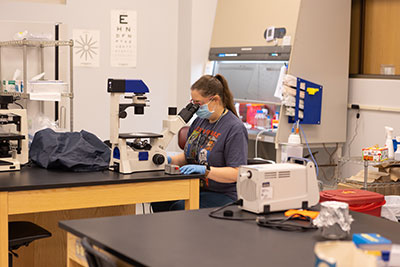Institutional Animal Care and Use Committee (IACUC)
Role and Function of the IACUC
USDA and Public Health Service (PHS) regulations require that all institutions using federal funds to carry out research or teaching that involve the use of live, warm-blooded vertebrate animals have a standing Institutional Animal Care and Use Committee (IACUC).
The role of the IACUC is to ensure the ethical use and sensitive care of animals utilized in research and teaching. Federal regulations obligate the IACUC to meet at least twice annually, and have at least five members (including at least one veterinarian, one scientist with laboratory animal research experience, one non-scientist, and one person with no institutional affiliation). The IACUC is required to monitor the use of animals in teaching activities as specified by USDA regulations, review all research projects proposed for PHS support, and evaluate institutional facilities used in the housing of animals. The activities of the Animal Welfare Committee also conform to the "University Policy Regarding the Use of Dead Animals and/or Dead Animal Parts" (1984, rev. 2003).
- This policy applies to dead, unpreserved, warm-blooded vertebrate animals only, except where noted in number 8.
- Under no circumstances whatsoever shall any student be permitted or encouraged to pick up dead animals. Such animals may not be brought to the University, or used outside the University in connection with any University-sanctioned activity.
- Animals and animal parts necessary to conduct course work experiences will be obtained from a licensed supplier or breeder, or from a slaughterhouse or grocery store. Domestic animals or animal parts may be obtained from a veterinarian if the Dean or Division Chairperson is given a statement from the veterinarian that animals supplied had no infectious diseases. Students and faculty may not collect (kill or capture) wildlife without a state or federal collector's permit. A copy of the permit and an annual report of collection activities must be filed with the Dean or Division Chairperson.
- Dissections and any similar activities are to be performed in areas designated for these activities, and with instruments intended for these activities. In addition (1) the areas must be properly vented; (2) students must receive faculty supervision at all times; (3) the faculty member is responsible for insuring that the area is completely cleaned and disinfected afterwards; and (4) the faculty member is responsible for insuring that the instruments are completely cleaned, disinfected, and properly stored.
- Students and faculty members engaged in these activities shall wear gloves (without tears), aprons, and any other reasonable protections necessary. Filtering masks may sometimes be necessary. Gloves are recommended for fresh slaughterhouse or grocery store material.
- At no time shall food or drink be brought into any area where dissections or any similar activities occur. Nor shall food or drink be brought into rooms or placed in refrigerators or cabinets where dead animals or animal parts are stored.
- Smoking will not be permitted during dissections or any similar activities.
- Any unwanted preserved or unpreserved animals or animal parts that remain following the completion of the activity should be double-bagged and stored in a closed trash can, until the Director of the Biosciences Research Facility can arrange for proper disposal.
- Faculty members may apply to the IACUC for exceptions to this policy. In that event, they should be prepared to answer questions concerning the legal, health, and public relations aspects of their proposals.
(Original Policy 1984; Revision Approved by Vice President James Pate, August 13, 2003)
- Annual updates - Principal Investigators are expected to submit annual updates of ongoing projects to the University Animal Welfare Committee. (Approved September 18, 2001)
- Observing animals at a zoo - Before observing animals at a zoo, the University Animal Welfare Committee encourages Principal Investigators to contact the appropriate zoo IACUC. (Approved March 4, 2003)
- Quorum - Although a quorum is not required to hold a meeting, a quorum is required for the University Animal Welfare Committee to conduct official business and to vote on research applications. A quorum is defined as a simple majority of members, but this must include at least one non-affiliated community member and one attending veterinarian. (Approved September 30, 2004)
- Recusal - Although the University Animal Welfare Committee chair or Biosciences Research Facility director may vote on, or approve, a research application submitted by the other, the chair and director are not allowed to approve their own research applications. Committee members are also not allowed to vote on their own research applications. (Approved September 30, 2004)
- Quorum - Ex-officio members are counted as part of the quorum as described in #3 above. (Approved September 20, 2005)
Instructions for completing the Animal Research and Use Request Form:
- Complete the Animal Research and Use Request Form either in Word or as a PDF:
- Send a signed copy of the completed form either electronically or via campus mail
to the IACUC chair or Biosciences Research Facility director:
- IACUC Chair: Dr. Beth Bowin,
College of Education, Tahlequah, Bagley Hall 112 - Biosciences Research Facility Director: TBD
College of Science & Health Professions, Tahlequah, SC 139
- IACUC Chair: Dr. Beth Bowin,


